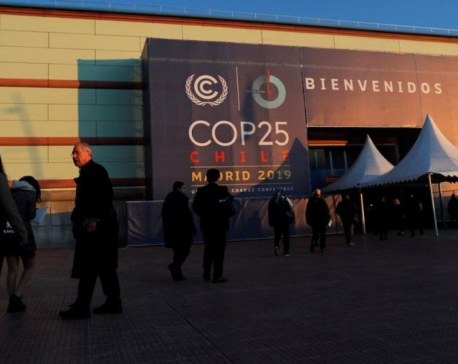
OR

KATHMANDU, Sep 8: In an alarming turn of events, Earth's surface temperature has shattered previous records over the past three months. From June to August this year, the planet's average surface temperature soared to 16.77 degrees Celsius, surpassing the norm by 0.66 degrees. This sweltering rise in temperatures has triggered a cascade of consequences, including elevated sea surface temperatures and a surge in extreme weather events worldwide, as indicated by a study commissioned by the European Union (EU)-funded Copernicus Climate Change Service.
The Copernicus report reveals that this temperature surge has led to unprecedented rainfall in Western Europe, Turkey, and widespread flooding across Europe, Asia, Chile, Brazil, Australia, and the United States. Disturbingly, Antarctica's ice levels decreased by 12 percent compared to previous years, while the Arctic Ocean witnessed a 10 percent reduction in ice cover during this period. August registered a historic high in sea surface temperatures, reaching 20.98 degrees.
August of this year marked the warmest month since the official recording of Earth's surface temperatures began in 1940. With four months remaining in 2023, this year is poised to become the second hottest on record. The previous record for warmest sea surface temperatures was set in August 2019. Remarkably, the average temperature for the first eight months of this year is a mere 0.01 degrees Celsius lower than the annual average during that period.
Addressing the report on Wednesday, UN Secretary-General António Guterres underscored the profound impact of scorching temperatures, emphasizing that extreme heat not only leaves us parched but also inflicts harm. He cautioned that our planet is simmering under the relentless heat of extreme summers, likening it to "climate breakdown" in motion. He urged swift action, stating, "As temperatures rise, so must our climate action. If we rise to the challenge, we can still avert climate chaos."
Highlighting the escalating impact of El Niño in the Pacific Ocean, Petteri Taalas, Secretary-General of the World Meteorological Organization, expressed concern about the looming temperature increases in the near future.
Carlo Buontempo, director of the Copernicus Climate Change Service, pointed out that temperature records continue to tumble one after another. Based on the data from the first eight months of 2023, this year is poised to become the second hottest on record in terms of annual temperatures. He remarked, "Not only are we witnessing an increase in extreme weather events, but previous temperature records are also consistently being broken."
A report published in May by the United Nations World Meteorological Organization and the UK Met Office predicted that one of the next five years could become the hottest on record. The report cautioned that within this timeframe, Earth's average temperature might rise by 1.5 degrees Celsius compared to pre-industrial levels. The Paris Agreement on Climate Change aims to limit global temperature rise to 1.5 degrees, not for a single year but for an extended period.
You May Like This

Earth's temperature likely marks hottest decade on record: report
MADRID, Dec 3 : The past decade is almost certain to be the hottest on record, weather experts warned on Tuesday,... Read More...

Mission: Sustainable Earth
What have you done? Greenly lands are spoiling my son. Air filled with smoke, makes my breath Choke Now seeing... Read More...

When moon came closest to earth in decades (Photo/Video)
KATHMANDU, Nov 15: The biggest and brightest full moon was lighting up in the sky in nearly after 69 years... Read More...







Just In
- NRB to provide collateral-free loans to foreign employment seekers
- NEB to publish Grade 12 results next week
- Body handover begins; Relatives remain dissatisfied with insurance, compensation amount
- NC defers its plan to join Koshi govt
- NRB to review microfinance loan interest rate
- 134 dead in floods and landslides since onset of monsoon this year
- Mahakali Irrigation Project sees only 22 percent physical progress in 18 years
- Singapore now holds world's most powerful passport; Nepal stays at 98th











Leave A Comment